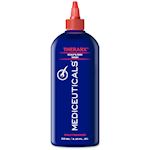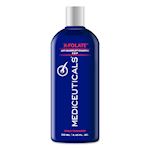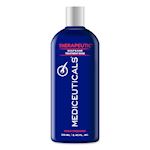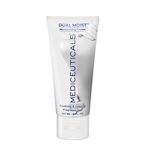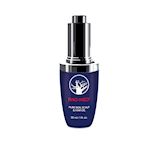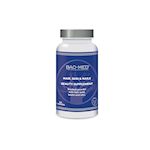-
PSORIASIS: WHAT IS IT AND WHAT CAN YOU DO ABOUT IT?
Do you suffer from red, itchy skin and flaky spots on your scalp and perhaps other places on your body? Then you may suffer from psoriasis. This chronic skin disease affects approximately 7.5 million to 8 million people in the USA.
Psoriasis is not contagious because a bacteria or virus is not the cause. Hereditary factors play a major role in the development of the disease. Research shows that if both parents suffer from this skin disease, the child has a 50% chance of developing psoriasis.
-
WHAT IS PSORIASIS?
The skin is continuously renewing itself. Old skin cells slowly die and peel off. The flaking happens so slowly that you don't notice it. New skin cells slowly form under the old skin cells and grow into new skin. Healthy skin takes about 30 days to shed old skin cells and grow new ones.
With people suffering from psoriasis, old skin cells die off too quickly. While old skin cells normally take about 30 days to die, with people suffering from psoriasis this only takes 6 to 7 days. There is a disruption of the replacement process of the skin cells. This means that the skin cells do not have enough time to die and shed, causing them to accumulate on the skin. This causes irritation and itching because these skin flakes often also become inflamed.
WHAT FORMS OF PSORIASIS ARE THERE?
There are several different forms of psoriasis. Each form is characterized by the fact that the psoriasis is located in certain places on the body.
Psoriasis Vulgaris
This is the most common form of psoriasis. In this form, psoriasis mainly occurs on the elbows, knees and back. Typical for this form is that the spots are often symmetrical.
Psoriasis capitis
In this form of psoriasis, the spots are mainly on the hairy scalp, around the hairline and behind the ears. Psoriasis on the scalp causes a lot of itching, flaking and irritation. Although scalp psoriasis looks a lot like eczema, there are some differences: The plaques on the scalp are random and vary in size. The flaking may also be more common and larger in certain places. While the flakes are often loose in eczema, in psoriasis they often remain attached to the scalp.
Psoriasis inversa
People who suffer from psoriasis inversa will find that most spots occur in the body folds. Consider, for example, the armpits, groin, inside of the elbow and the pubic area.
WHAT IS THE CAUSE OF PSORIASIS?
The precise cause of psoriasis is not yet known. We do know that it can be hereditary. If one parent has psoriasis, the chance of developing the skin disease increases by 10%. If both parents have it, this even increases to 50%.
In addition, we know that various factors can provoke or worsen complaints:
- Infections, such as a sore throat, flu, or skin infections.
- Broken skin, due to a cut or scrape, an insect bite, or severe sunburn.
- Weather conditions, especially cold, dry conditions.
- Stress.
- Smoking (including passive smoking) or a lot of alcohol.
- Some medications, including; lithium, high blood pressure medications, malaria pills, and painkillers such as ibuprofen and diclofenac.
- An inflammation in another place in your body.
- Abruptly stop taking oral or systemic corticosteroids.
CAN PSORIASIS BE CURED?
Unfortunately, there is no therapy or treatment to completely cure psoriasis. In all cases, the treatment of psoriasis involves treating the symptoms. This helps to prevent skin damage and not to shower for too long and too hot. It is also better not to use soap but instead opt for an oil-based body wash. The oilier and more supple the skin is, the less psoriasis you will suffer from.
Because psoriasis is manifested by plaques and flakes on the (scalp) skin and is therefore often clearly visible, it can have a negative effect on your self-confidence. Fortunately, you can reduce flaking and itching yourself by using the right products. For example, there are care products available that have a positive effect on the progression of psoriasis capitis. Contact a certified Mediceuticals salon in your area for professional advice if you suffer from psoriasis on the scalp.
WHICH PRODUCTS CAN I USE FOR IRRITATION AND FLAKES?
An irritated and itchy scalp is very annoying and sometimes even painful. Scales on your head, shoulders and clothing also often have a negative impact on your mood. To combat flakes, using a nourishing shampoo and scalp conditioner is a good option. At Mediceuticals we have the Dandruff Kit for irritated scalps. Here you will find our X-Folate shampoo that loosens the flakes and reduces inflammation of the scalp.
After washing with the shampoo, it is important to balance the acidity (pH value) of the scalp. This is possible with the Therapeutic conditioner that is also included in the Dandruff Kit. It soothes the sensitive scalp and ensures the correct moisture balance of the skin.
Before using the shampoo, first apply Therarx, which you will also find in the Dandruff Kit. Spread this product over your entire (dry) scalp before washing. Leave it on for 1 to 2 minutes, then dampen the hair and immediately apply the shampoo. Rinsing the Therarx is therefore not necessary.
These products may also be used on the body if you also suffer from irritation or flakes on other areas apart from your scalp. To hydrate and repair the skin, you can also use the Bao-Med oil in combination with the Dual Moist.
LEARNING TO LIVE WITH PSORIASIS
Unfortunately, psoriasis cannot be completely cured. With the right care products, it is possible to reduce the symptoms. The doctor can also prescribe medications (often hormone ointments) that reduce the symptoms or make them more bearable. In addition, your psoriasis often does not always bother you as much. Calm periods and periods in which the skin disease is more active alternate regularly.
Do you suffer mainly from shame or do you feel insecure, anxious or gloomy due to psoriasis? Does it make you sleep poorly and is the itching sometimes unbearable? Then talk about it. This could be with family or friends, but also with your doctor or a psychologist. Because skin disease never goes away completely, you must learn to comfortably live with it.
-
DO YOU WANT MORE INFORMATION ABOUT MEDICEUTICALS?
For personal advice you can contact us or make an appointment at one of our certified Mediceuticals salons.




